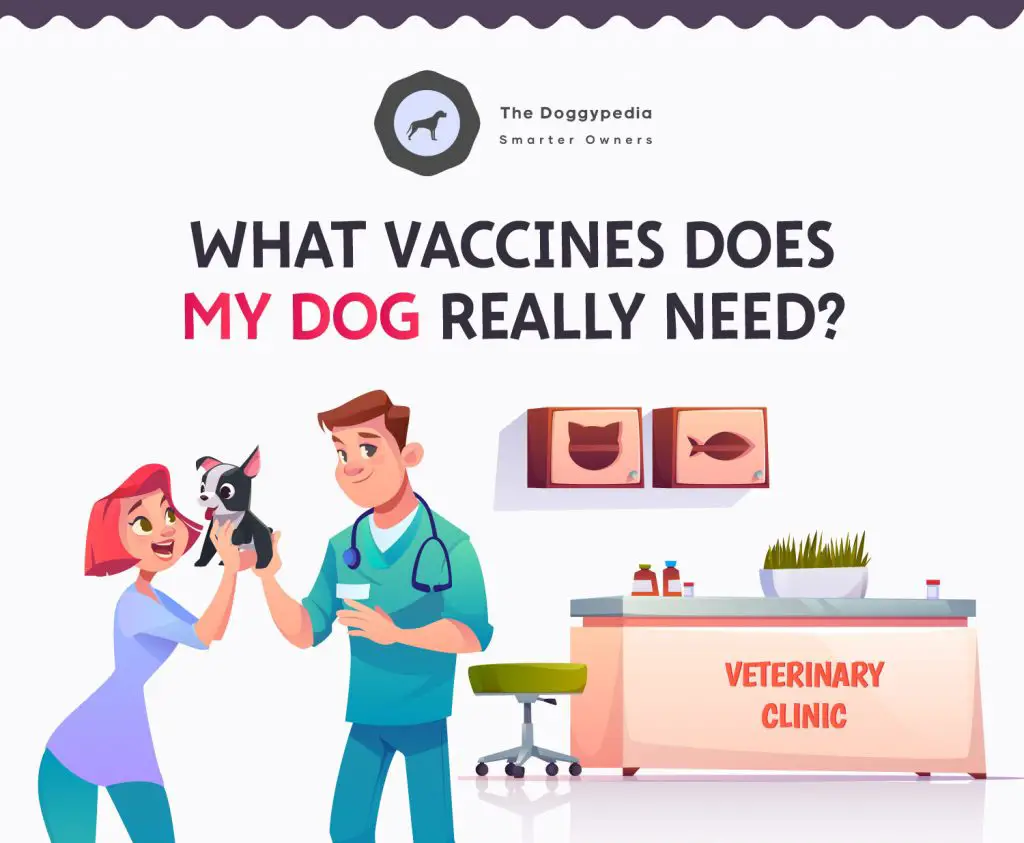
With more and more studies indicating that we may be over-vaccinating our pets, it’s difficult to be sure whether your dog actually needs all those annual booster shots. If you’re wondering which vaccines are required by law and how long their immunity lasts for, then you’ve found the right place.
From questions such as “can I vaccinate my own dog?” to “what are the mandatory dog vaccines?”, we discuss all this and more in our comprehensive guide to all you need to know about vaccines for your four-legged friend!
Are Dog Vaccinations Necessary?
In almost all states proof of rabies vaccination is mandatory.
The exact laws vary from state to state, with a few allowing exemptions for dogs that are medically unsuitable to have this particular shot. Some states require annual rabies vaccinations, while others require a once every three years rabies vaccine.
Aside from the rabies vaccine, other vaccines available are not required by law. However, this does not make them surplus to requirements. Vaccines are essential to protect your dog from many illnesses. Thanks to widespread vaccination campaigns, many deadly canine diseases are now much rarer than ever before.
However, while many dog vaccines are classed as essential, there are certain risks that need to be taken into account. Not all vaccinations that are available are necessarily the right choice for your dog. Your veterinarian will be able to let you know which vaccines are appropriate for your dog, taking into account their location, lifestyle and health.
So, if you’re wondering which vaccines your dog really needs to have, be sure to talk your concerns over with your vet. To help you to optimize your visit to your vets and to gain a greater understanding of which dog vaccinations are the most essential, we’ve put together this canine vaccination guide.
While there is a very real worry that we are over-vaccinating our pets, on the other hand, we don’t want them to lose any of the protection provided by these simple, well-established vaccines that could potentially save their life.

How Long Does Dog Vaccine Immunity Last?
First of all, let’s consider how vaccines actually work.
In short, vaccines contain antigens which are very similar to the organisms that cause the disease. These antigens are injected into your pet’s bloodstream, causing the immune system to react. Should your pet then be exposed to the actual, real-life disease, their immune system will already have its defense prepared to overcome the disease completely, or at the very least, to reduce its severity and decrease recovery time.
Traditionally, we used to believe that vaccines needed annual boosters in order to maintain this immunity. However, an increasing number of studies have shown that properly vaccinated dogs tend to keep their immunity for a duration of several years. In general, it is safe to say that many adult dogs will remain immune after vaccination for approximately three years.
Now, while we don’t want to vaccinate our pets unnecessarily, at the same time, it would be tragic to leave them exposed to deadly illness just for the want of a more frequent vaccine program. So, how can you reliably tell if your dog still has immunity? Can I skip my dog’s annual booster vaccine without risk?
There is a tried and tested way to check your dog’s immunity levels – titer tests.
Titer tests for dogs involve taking a small blood sample. This blood is then analyzed to give a reading of the level of antibodies present. If your vet performs a titer test on your dog, you will know whether or not your dog has sufficient immunity or whether they do, in fact, need a booster.
Basically, titer tests can take the guesswork out of how often you actually need to vaccinate your dog.
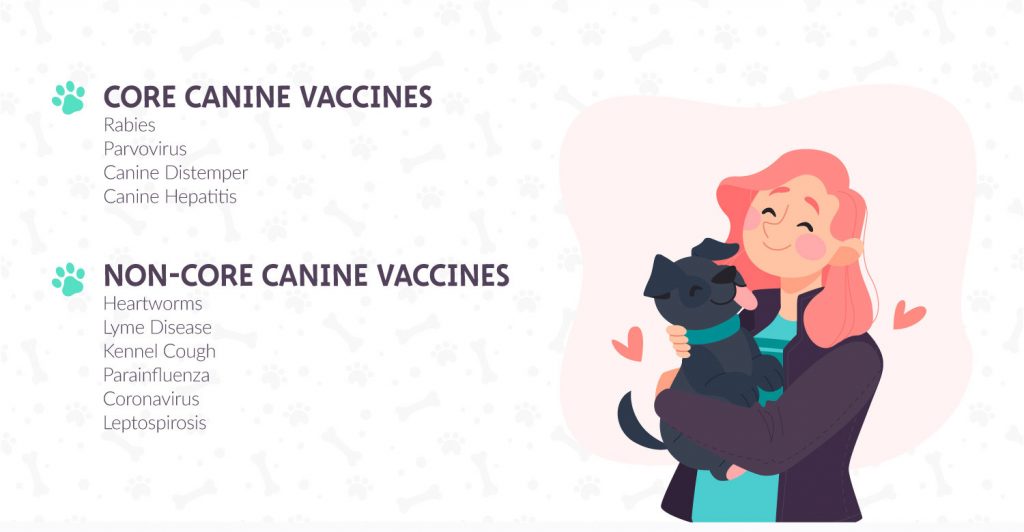
Absolutely Necessary vs Optional Vaccines
There are a lot of different dog vaccines available and trying to figure out which ones your pet needs can be very confusing. To make it clear which dog vaccines are absolutely necessary, all canine vaccines can be placed into one of two categories: core or non-core.
Core vaccines are considered essential. Unless your veterinarian specifically recommends against one of them because of an underlying allergy or health condition, your dog will almost certainly need to be vaccinated against canine distemper, hepatitis, parvovirus and rabies.
On the other hand, non-core vaccines are optional and depend upon your dog’s level of risk exposure and their general health. Non-core canine vaccines prevent diseases such as kennel cough, Lyme disease and leptospirosis.
Let’s take a closer look at what these required shots for dogs protect against, as well as some of the non-mandatory dog vaccines that your pet may require.
Core Canine Vaccines
Here are the main diseases which your dog needs to be vaccinated against. These core vaccines for dogs are classed as essential to your pet’s well being and general good health.
Rabies
In almost all states, proof of rabies shots is mandatory. This viral disease is extremely serious, with the highest mortality rate of any disease on the planet.
Untreated it ends in certain death within 10 days, with the infection passed on through the saliva of an infected animal. The rabies vaccine is extremely effective and generally well-tolerated, saving a huge number of dogs, preventing untold suffering, and protecting owners and their families.
Parvovirus
Highly contagious, canine parvovirus particularly affects puppies and young dogs. It can be lethal. Vaccines against parvovirus are recommended for all puppies. They are normally given in a series of three shots, followed by a booster, then once every three years.
Canine Distemper
A very serious and often lethal disease, canine distemper is also highly contagious. It affects the digestive, respiratory, and central nervous systems. The vaccine against canine distemper is highly effective and usually combined with parvovirus and adenovirus shots.
Canine Hepatitis
Also known as adenovirus, canine hepatitis causes acute liver infection in dogs. It is a very difficult disease to treat, although it can be prevented by vaccination. The canine hepatitis vaccine is usually combined with distemper and parvovirus shots.
Non-core Canine Vaccines
Here is a selection of some of the most common non-core vaccines for dogs.
While they are optional, if you live in certain areas where your dog faces an increased exposure to certain diseases, or if your dog has certain health risks, then your veterinarian may recommend some of the following additional vaccines.
Heartworms
If you are happy with your current oral or topical preventive treatment against heartworms then you won’t need a vaccine. However, a heartworm shot provides your dog with six months of protection unlike other monthly treatments.
Bear in mind that unlike traditional oral heartworm preventive medication, heartworm vaccines for dogs do not protect against common intestinal parasites. They also can cause a wide range of side effects, so be sure to consult your veterian to see if it’s an appropriate choice for your dog.
Lastly, this is not one of the DIY dog vaccinations, it must be carried out by a certified veterinarian.
Lyme Disease
If you live in an area with a high potential for tick exposure then your vet may advise vaccinating your dog against Lyme disease. It is recommended that dogs suffering from protein urinary issues or general ill health do not have this vaccine.
Kennel Cough
Kennel cough is a highly contagious respiratory disease that is typically not life threatening for healthy dogs. However, proof of vaccination is often required for kennels, dog shows and training class participation.
Kennel cough can be caused by various strains of bacteria, of which bordetella is one of the more serious.
Parainfluenza
The canine parainfluenza virus results in an upper respiratory tract infection.
It is prevalent where there are a high number of dogs living in close proximity, such as kennels. Alone, it rarely causes complications, however, combined with bordetella and other infections it can become much more serious and is thought to play a major role in kennel cough itself.
Bordetella vaccinations usually cover canine parainfluenza virus too.
Coronavirus
Canine coronavirus (not to be confused with the Covid19 virus in humans) causes gastrointestinal problems in dogs.
It is usually contracted through direct contact between infected dogs or fecal matter. While most dogs will recover easily, some animals suffer from more severe cases, especially when combined with a secondary infection.
Your vet will inform you if your dog could benefit from having a coronavirus vaccine.
Leptospirosis
If your dog is at high risk of contracting leptospirosis, then your vet will most probably recommend vaccinating against it.
Leptospira bacteria can infect both humans and animals. It is carried by wildlife such as deer, rats, and raccoons, amongst others. Your dog can contract it from damp places where such wildlife urinate, for example, streams, puddles, and infected soil.
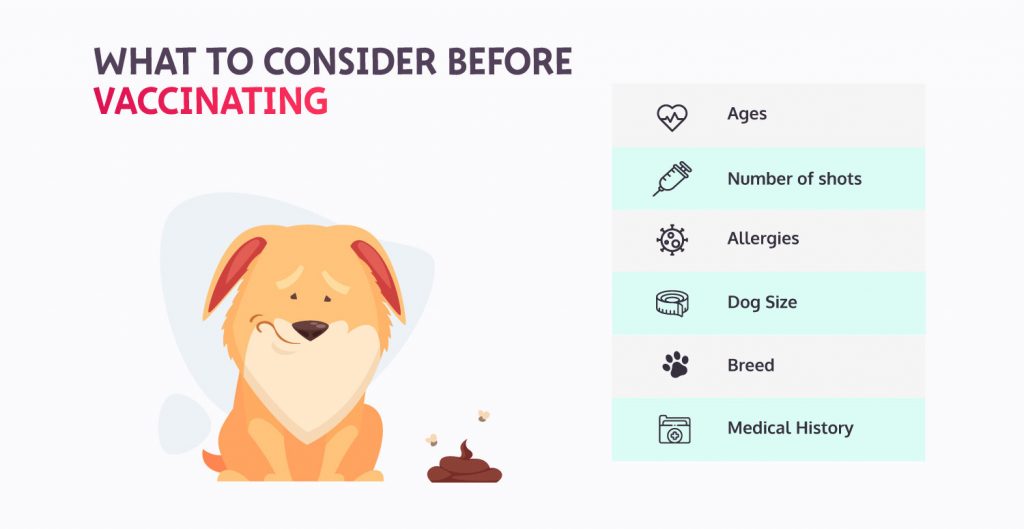
What to Consider Before Vaccinating
Before you take your dog for any non-core vaccinations, it is worth considering the following factors.
This list will help you to know what to ask your vet and allow you to formulate any important questions relating to your dog’s health and general well being before your visit.
Don’t forget that, as your dog’s owner, you know your pooch better than anyone. So it’s important that you pass on any essential information to your vet concerning their suitability for any additional vaccinations.
Here are some of the main factors to bear in mind.
Age
Puppies and young dogs are often most vulnerable to diseases as their immune systems have not yet fully evolved. It is important to get your puppy immunized at the correct age.
If you have any doubts about when your puppy needs their first and subsequent vaccines be sure to contact your vet. At the other end of the spectrum, older dogs may struggle with vaccines as they reach their senior years.
Have a chat with your vet if you feel that your elderly dog would be better off having fewer and less frequent vaccines.
Number of shots
Having a large number of injections all at once increases the risks of side effects. Also, if your dog does have a reaction to one of the vaccines, you won’t know which individual one it is to.
Where possible, space out your dog’s vaccines and pay an extra visit to the vets for any first time non-core vaccines. Once you’ve established that your dog is fine with a certain vaccine, you can always request that they are given together in the future.
Allergies
If you have adopted a dog, double check through their medical history for any allergies.
Talk this over with your vet, as some dogs have allergies to certain vaccine ingredients. In some cases, a lot of discomfort can be avoided with no drop in protection by simply switching to another brand of vaccine.
Dog size
If you have any concerns regarding your dog’s size and weight, talk it over with your vet prior to taking them in for their shots. An underweight or malnourished dog may struggle after a vaccine. Your vet will be able to best advise you on how to proceed.
Breed
Certain dog breeds have specific negative reactions to certain vaccine ingredients.
While we can’t list every possibility here, be sure to talk over your concerns with your vet. This is especially common amongst herding dog breeds, both purebred and mixed races.
So if you’re aware of your dog’s family tree, be sure to look up any specific peculiarities of each breed that makes up a part of your dog.
Medical history
If you’ve moved home to a new area, have changed vets or taken on a new dog, then make sure that you take their full medical history with you to your vets if possible.
Any adverse reactions to any previous vaccines will be noted. This will help your vet to decide whether or not your dog really does need that non-core vaccination.
How to determine your dog’s risk of infection?
Not only are all dogs individuals, different areas and different lifestyles can all impact upon your dog’s risk of infection.
- Breed – Some breeds are at a higher risk of certain diseases than others. Your vet may recommend a non-core vaccination even if you consider your dog to be low risk. Always check your dog’s specific breed for any increased likelihood of medical conditions and diseases.
- Overall health – While you don’t want to vaccinate a sick dog, dogs with ongoing illnesses and poor medical history are more likely to be a greater risk from diseases that could be prevented with a non-core vaccine. Talk to your vet if you think that your dog may benefit from extra vaccinations due to a weakened immune system.
- Location – Depending upon where you live, some non-core vaccines may be more important than in other parts of the country. Certain areas are known for their high tick counts, while others may have prevalent strains of leptospirosis that are covered by the vaccine.
- Lifestyle – Is your dog often exposed to wildlife with a high risk of catching leptospirosis? Do you often board your dog in kennels? Does your dog attend a training class or have a dog walker? Your dog’s lifestyle can affect their likelihood of catching a disease that could be prevented with a non-core vaccine. Your Vet will be able to advise whether non-core vaccines are beneficial to your dog.
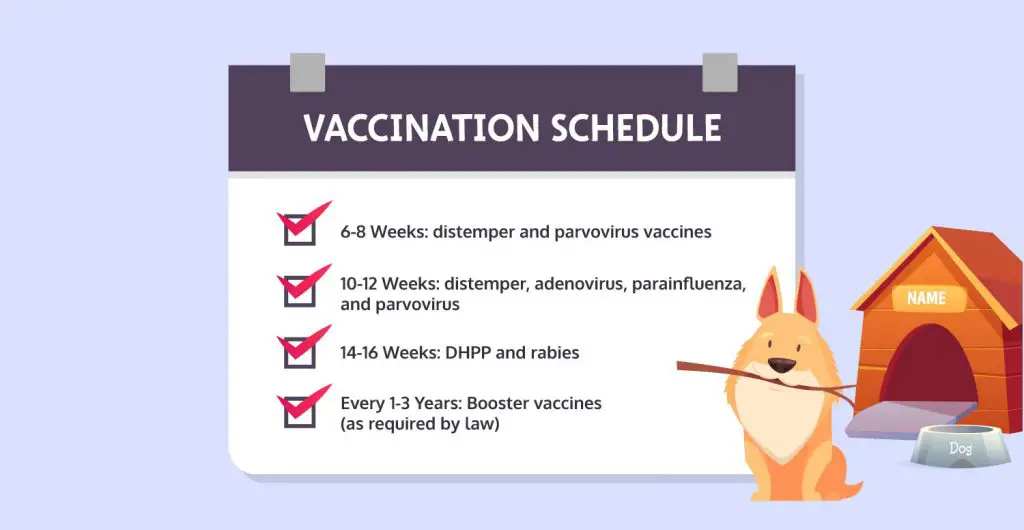
When should you vaccinate your dog? And how often?
Bearing all this in mind, when should you vaccinate your dog and how often? Let’s check how often your puppy or adult dog needs vaccinating.
Puppies
Your puppy should receive their first shots at 6-8 weeks old. These are to protect against distemper and parvovirus.
Prior to this they should have received some immunity from their mother’s milk. As they grow and this natural immunity begins to wane, it is important to protect them with a series of vaccinations. This will ensure that they build up their immune systems at levels appropriate for their size, age and weight.
After the initial vaccines at 6-8 weeks, there are two additional sets of vaccinations, one at 10-12 weeks, for DHPP (distemper, adenovirus, parainfluenza, and parvovirus). After this they are usually scheduled for further vaccination against DHPP and rabies at 14-16 weeks.
Adult dogs
Adult dogs that have not already been vaccinated will also need a staggered vaccination program. The first set of shots should take place 2-3 weeks before a second lot. This allows their immune system to build up and ensures a full level of protection.
Traditionally it has been standard practice to repeat adult dog vaccines every year. While this is the case for rabies shots in some states, not every dog will require a booster vaccine every year for other core and non-core vaccinations.
Depending upon the factors discussed above, titer tests, and a discussion with your veterinarian, your dog may be better off having most of their vaccines every three years.
Anti-Vaxxer Beliefs
In the same way that a minority of people are opposed to human vaccination, there has been a spike in recent years of those who refuse to vaccinate their dogs. This is because they believe that vaccinating their dog is hazardous to its health.
Dog anti-vaxxers hold the same grossly misinformed and dangerous views as human anti-vaxxers. They believe that vaccinating your dog can lead to ‘canine autism’ or ‘immuno-suppression’. Canine autism does not exist. These views have no basis in science and there is absolutely no evidence to support them.
By refusing to vaccinate when it has been recommended to do so, anti-vaxxers fail to protect their beloved pets from serious debilitating diseases, immense suffering and early death.
Can you Over-Vaccinate your Dog?
The risks from vaccinations are far less than the risks of contracting the disease itself.
Vaccines save countless lives and prevent massive amounts of suffering. So, while some vaccines may cause a little short-lived discomfort, it is important to vaccinate your dog nonetheless.
If your dog is one of the rare cases who has suffered an adverse reaction to particular vaccines, it is important to talk this over with your veterinarian. Do not be afraid to explain your fears and to ask questions before they proceed with a vaccine.
While adverse reactions to canine vaccinations are very rare, they are possible. We recommend always keeping the day free after your dog’s first experience with a new vaccine in order to monitor them, just in case a problem arises. If your dog reacts adversely to a vaccination, always call your vet immediately.
As vaccinations should only mildly stimulate your dog’s immune system, on the whole, there should be no problem if your dog receives a vaccine once a year rather than every three years. It is better that they are safe from some of these devastating diseases, rather than underprotected.
However, you can always rely upon a titer test to let you know just how much protection they have remaining and whether or not they actually need the booster vaccine when it is due.
The one exception is your dog’s rabies vaccine.
This must be carried out as specified in the laws of your state. While you can vaccinate your dog yourself against many vaccinatable diseases, note that for rabies, your dog’s proof of vaccination has to be filled in by a certified veterinarian.
Summary
Aside from the rabies vaccine that is mandatory in almost every state, it is also highly recommended that you vaccinate your dog with the core vaccines. Depending on your dog’s lifestyle, their age, breed, and location, other non-core vaccines may also be necessary to protect them from a high risk of disease.
Adult dog’s immunity levels can remain high even for several years. If you are worried about unnecessarily vaccinating your dog every year, speak to your vet about your concerns. Some vaccines can be given every three years for adult dogs and even skipped for some dogs in their senior years.
As the saying goes, prevention is better than cure. Make sure that your dog is correctly vaccinated. If you have any concerns, be sure to raise them with your veterinarian and if you feel they could space out their vaccination program over a longer duration, then ask them to perform a titer test and find out how well protected your dog actually is.
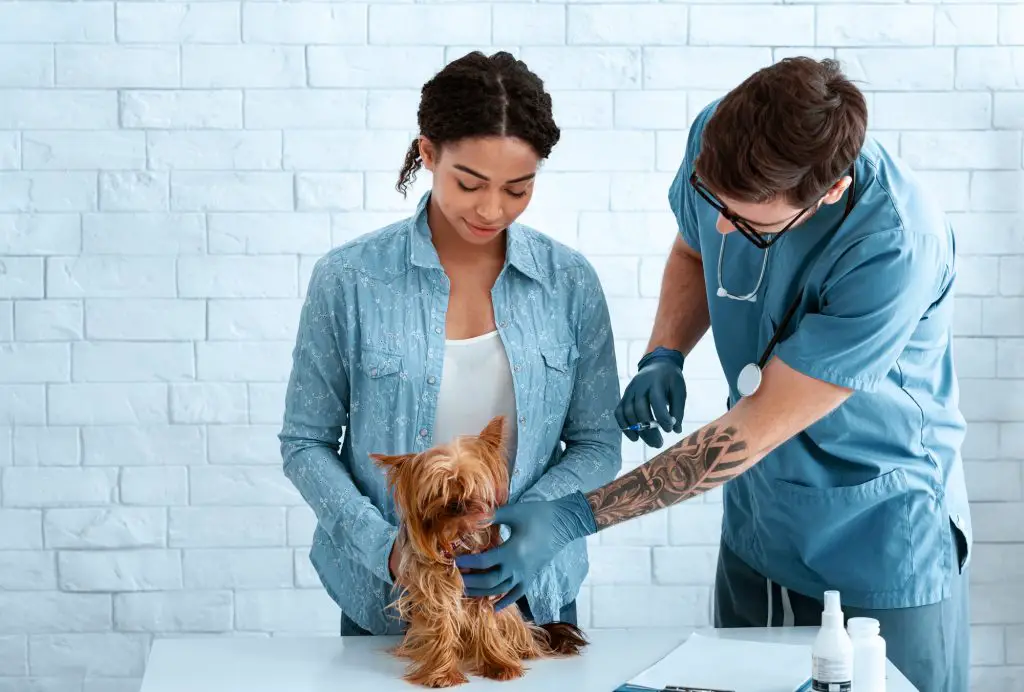
Sources:
- https://www.akc.org/expert-advice/health/puppy-shots-complete-guide/
- https://www.pattvet.com/services/dogs/dog-vaccinations
- https://www.cdc.gov/healthypets/pets/dogs.html
- https://www.rabiesaware.org/
- https://vcahospitals.com/know-your-pet/coronavirus-disease-in-dogs
- https://www.vet.cornell.edu/departments-centers-and-institutes/baker-institute/our-research/animal-health-articles-and-helpful-links/canine-parvovirus
- https://vcahospitals.com/know-your-pet/leptospirosis-in-dogs-the-disease-and-how-to-test-for-it
- https://www.akc.org/expert-advice/health/akcs-chief-veterinary-officer-on-tick-borne-disease-symptoms-prevention/
